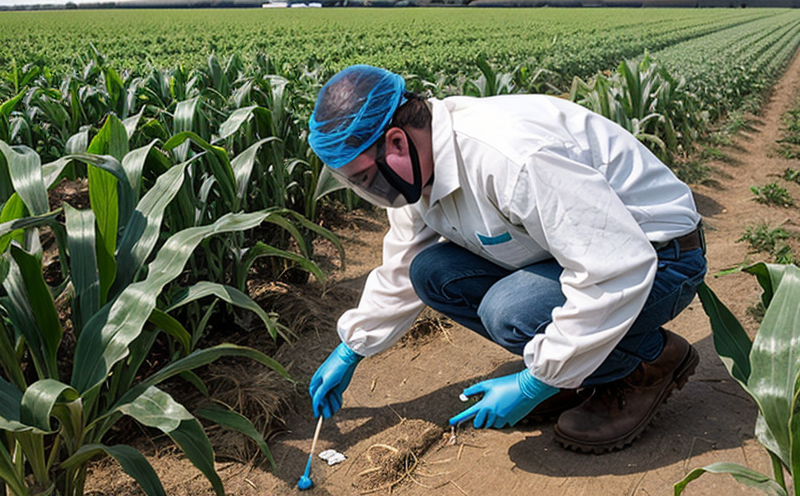Spinosad Residue Testing in Crops
Spinosad residue testing is a critical component of agricultural quality assurance and compliance, especially for crops treated with spinosad, an insecticide derived from the bacterium Dornavallia (Saccharopolyspora) spinosa. This service ensures that residues in harvested crops comply with international standards such as ISO 3696:2015 and local regulations to protect consumer health, environmental sustainability, and market access.
The testing process involves several steps that are crucial for accurate results. Samples of the treated crops must be collected in a manner that ensures representativeness, avoiding contamination from other sources. The samples are then prepared according to standard protocols before undergoing instrumental analysis. For spinosad, liquid chromatography-tandem mass spectrometry (LC-MS/MS) is often used due to its high specificity and sensitivity.
The acceptance criteria for spinosad residues are stringent and vary by crop type and intended use. For instance, processed foods have lower allowable limits compared to animal feeds or agricultural products that will be further treated before consumption. Compliance with these standards not only ensures food safety but also maintains brand reputation and market credibility.
Testing for spinosad residues is particularly important in crops like fruits, vegetables, and grains where the insecticide can persist after application. The presence of even trace amounts can lead to health risks if consumed above permissible limits. By offering this testing service, our laboratory helps quality managers and compliance officers ensure that their products meet these stringent requirements.
The process begins with sample collection, which must be done carefully to avoid contamination or degradation. This is followed by thorough sample preparation, including extraction and clean-up procedures optimized for spinosad's chemical properties. The final step involves the analysis using LC-MS/MS, where precision and accuracy are paramount.
The results of these tests are reported in accordance with international standards and local regulations. They provide a clear picture of the spinosad residue levels present in the crop samples. This information is invaluable for decision-making processes related to product safety, labeling, and market positioning. Our laboratory uses state-of-the-art equipment and employs highly skilled technicians to ensure reliable and accurate results.
By offering this service, we help our clients stay ahead of regulatory changes and market demands, ensuring that their products are not only safe but also sustainable and compliant with global standards.
Benefits
- Ensures Compliance: Stay within legal limits of spinosad residue in crops, thereby avoiding fines and penalties.
- Protects Consumer Health: Guarantees that the products meet safety standards for human consumption.
- Enhances Market Access: Helps in maintaining export markets by ensuring adherence to international standards.
- Safeguards Brand Reputation: Ensures that your brand remains trusted and reputable among consumers.
- Supports Sustainability Efforts: Contributes to the overall sustainability goals of agricultural practices.
Why Choose This Test
The importance of spinosad residue testing in crops cannot be overstated. It is a vital step in ensuring that the products you bring to market are safe and compliant with international standards. Our laboratory offers this service to help you meet these stringent requirements effectively.
Our team of experts uses cutting-edge technology and follows strict protocols to ensure accurate results. Whether you need testing for regulatory purposes or simply want to maintain high-quality standards, our services can provide the assurance you seek. By choosing us, you are investing in the safety and reputation of your products.
We understand that each client has unique needs, which is why we tailor our services to meet those specific requirements. From sample collection guidance to comprehensive reporting solutions, we are committed to providing top-notch service.
Trust us to help you navigate the complexities of spinosad residue testing and ensure compliance with all relevant regulations. Together, let’s protect consumer health and maintain your market position in a competitive environment.
Environmental and Sustainability Contributions
The environmental impact of pesticides like spinosad is significant, making residue testing an essential tool for sustainability efforts. By ensuring that the levels of spinosad residues in crops are within acceptable limits, we contribute to reducing potential harm to ecosystems.
Spinosad is considered a more environmentally friendly option compared to some conventional insecticides due to its lower toxicity and rapid degradation in soil and water. However, excessive or improper use can still lead to environmental issues. Through our testing services, we help minimize these risks by identifying any potential overuse or misuse.
The information obtained from residue tests is crucial for developing best practices in pesticide application and management. This data can inform farmers about optimal dosages and timing, reducing unnecessary exposure and promoting sustainable agricultural practices.
Our laboratory also plays a role in supporting research aimed at improving the environmental impact of spinosad use. By providing accurate residue level data, we contribute to scientific understanding and innovation. This collaborative effort helps drive more sustainable pest management strategies that benefit both agriculture and the environment.
By choosing our services for spinosad residue testing, you are not only ensuring compliance with regulatory requirements but also supporting broader sustainability goals. Together, let’s work towards a future where agricultural practices are both productive and environmentally responsible.





